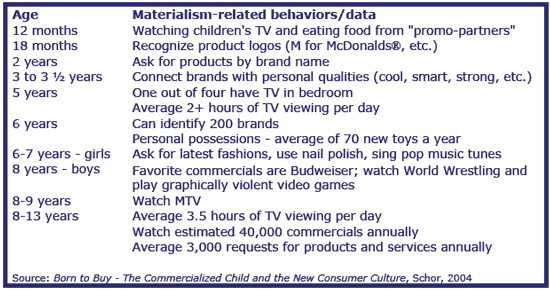Sex sells.
When children are involved, has the marketing industry crossed a line?
Such practices continue, generally unchanged, with full knowledge and deliberate intent by the industry.
For the right wing conservatives and free market capitalists among us, here's a glass of cold water in the face:
"For the last few decades, critics such as Thomas Frank, Kevin Phillips, David Harvey and many others have warned us, and rightly so, that right-wing conservatives and free-market fundamentalists have been dismantling government by selling it off to the highest or "friendliest" bidder. But what they have not recognized adequately is that what has also been sold off are both our children and our collective future, and that the consequences of this catastrophe can only be understood within the larger framework of a politics and market philosophy that view children as commodities and democracy as the enemy. In a democracy, education in any sphere, whether it be the public schools or the larger media, is, or should be, utterly adverse to treating young people as individual units of economic potential and as walking commodities. And it is crucial not to "forget" that democracy should not be confused with a hypercapitalism."
Among the factors facing the nation, cultural change is being imposed by a powerful and conscienceless marketplace. We've removed all the guard dogs, and the flock is being mauled by wolves.
Successful strategies:
- Parental involvement, thoughtful access controls along with frequent discussions on the rationale. Make the strategy a family effort with a good goal for all.
- Parental example of rising above the celebrity and materialistic messages along with thoughtful and perhaps light-hearted discussions about why. Limit 'screen' exposure for the whole family, perhaps as a collaborative decision.
- Stay focused; use opportunities to point out and discuss how advertising is exaggeration, overstatement, and an attempt to get money, nothing more. Do the same with celebrity issues, famous for being famous.
- Live on a thoughtful budget, and include the kids in the planning. Do some discount and thrift store shopping; it can help put brand and style in perspective.
- Be part of a community and church that does a lot of things outside, together, and apart from the 'style' culture. Sports, ballet, and gymnastics can be great motivators. Worship and getting together with like-minded folks in church is a great way to refocus on what matters.
- Leave the country. Go live for a while in the developing world with maybe one television channel and no internet. Live like the other 80% of the world and learn how survival works. Okay, that's not for everybody.
- Have a goal; discuss it, write it down, do the work for your own life and for the person your child will become. It is not a small thing.
Kids are smart; with help, they can learn how to make their own decisions about such things with objectivity and a good conscience.
Things are not as they seem.
You were born into a world at war.
Everything you do counts. You were born into a world at war.


















